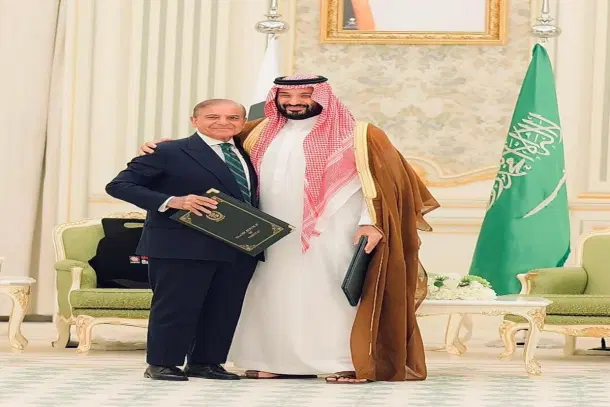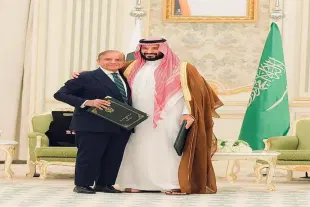News Brief
Pakistan Extends Nuclear Umbrella To Saudi Arabia Under New Defence Pact
Arzoo Yadav
Sep 20, 2025, 11:45 AM | Updated 11:45 AM IST
Save & read from anywhere!
Bookmark stories for easy access on any device or the Swarajya app.


Pakistan Defence Minister Khawaja Asif confirmed that Saudi Arabia could access Pakistan’s nuclear capabilities under a new mutual defence pact, the first time Islamabad has openly acknowledged placing Riyadh under its nuclear umbrella, reported India Today.
Speaking to Geo TV, Asif said, “What we have, our capabilities, will absolutely be available under this pact.”
The agreement, signed during Prime Minister Shehbaz Sharif’s visit to Riyadh on Wednesday (17 September), declares that any attack on one nation will be considered an attack on both.
Asif described the pact as “an umbrella arrangement offered to one another by both sides: if there is aggression against either party, from any side, it will be jointly defended, and the aggression will be met with a response.”
He stressed the pact is defensive, not offensive, noting, “We have no intention of using this pact for any aggression. But if the parties are threatened, then obviously this arrangement will become operative.”
A senior Saudi official told Reuters, “This is a comprehensive defensive agreement that encompasses all military means.”
Pakistan estimates its nuclear arsenal at around 100–120 warheads, comparable to India’s 172.
Asif emphasised, “All our nuclear installations are open to inspections. We get certificates for our facilities. We are an abiding nuclear power and don’t violate anything.”
India’s Ministry of External Affairs said it expects Saudi Arabia to consider “mutual interests and sensitivities” and will assess the pact’s implications for national and regional security.
Analysts, including Ian Bremmer of Eurasia Group, noted the pact strengthens Islamabad, potentially alters New Delhi’s security calculus, and signals Riyadh’s deeper engagement in regional defence amid heightened Gulf tensions following Israeli attacks targeting Hamas leaders.
Please click here to add Swarajya as your preferred and trusted news source on Google.
Also Read: ‘War Shouldn’t Feed Egos’: IAF Chief Explains Why India Ended Operation Sindoor Conflict Early




